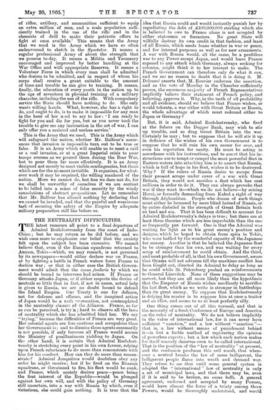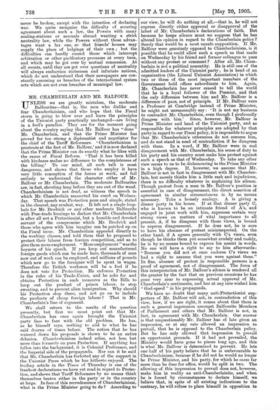T 11..b latest rumours all point to a final departure of
Admiral Rozhdestvensky from the coast of Indo- China ; but he may return as he did before, and we wish once more to emphasise our belief that the anxiety felt upon the subject has been excessive. We cannot believe that, even if the Russian squadrons returned to Annam, Tokio—which, we may remark, is not governed by its newspapers—would either declare war on France, or by fighting a battle in French waters force France to declare war ; or that in either case the British Govern- ment would admit that the cams foederis by which we should be bound to intervene had arisen. If France or Germany attacks Japan, or if either respects the duties of neutrals so little that in fact, if not in name, actual help is given to Russia, we are no doubt bound to defend the Island Empire. Our Treaty is one for defence, not for defence and offence, and the imagined action of Japan would be a rash nravocation, not contemplated in the neutrality clauses of the Alliance. France, so far as can be perceived, is try; hard to observe all the laws of neutrality which she has admitted bind her. We say "trying," because the difficulties of France are very great. Her colonial agents are less cautious and scrupulous than her Government is ; and to dismiss those agents summarily is not possible, if only because all France would accuse the Ministry of pusillanimous yielding to Japan. On the other hand, it is certain that Admiral Rozhdest- vensky is stretching every point in his own favour, relying upon French reluctance to do more than remonstrate with him for his conduct. How can they do more than remon- strate? Admiral Jonquieres would doubtless obey any order he might receive ; but if he fired on the Russian squadrons, or threatened to fire, his fleet would be sunk, and France, which acutely desires peace—peace being the first interest of the Republic—would be plunged against her own will, and with the policy of Germany still uncertain, into a war with Russia by which, even if victorious, she could gain nothing. It is true that the idea that Russia could and would instantly punish her by repudiating the debt of £400,000,000 sterling which she is believed to owe to France alone is not accepted by either statesmen or financiers. No great State will wilfully destroy its own credit in that fashion, and least of all Russia, which needs loans whether in war or peace, and for internal purposes as well as for new armaments. A war with Russia would, all the same, be a profitless war to any Power except Japan, and would leave France exposed to any attack which Germany, always seeking for colonies, might think it to her interest to make. The French Government can therefore only do what it can, and we see no reason to doubt that it is doing it. M. Delcasse asserts that, M. Rouvier endorses the assertion, and as the vote of Monday in the Chamber sufficiently proves, the enormous majority of French Representatives implicitly believe their statement of French policy, and believing, approve it. Why, in the teeth of all probability and all evidence, should we believe that France wishes, or would tolerate, a war either with Great Britain or Russia, the whole advantage of which must redound either to Japan or Germany ?
But, it is said, Admiral Rozhdestvensky, who fired at the fishers on the Dogger Bank, may wish to stir up trouble, and so drag Great Britain into the war. Certainly he may ; but to suppose that he will stir it up in defiance of the wishes of his own Government is to suppose that he will ruin his own career for ever, and even his reputation for sanity. He must be acting in accordance with his instructions, and to assert that his in- structions are to tempt or compel the most powerful fleet in Eastern waters into attacking him is to assert that Russia, which is full of hope in his fleet, wishes it to be destroyed. Why ? If the rulers of Russia desire to escape from their present scrape under cover of a war with Great Britain, they would not sacrifice a fleet which has cost millions in order to do it. They can always provoke that war if they want it—which we do not believe—by seizing Herat, or formally demanding from Kabul a right of way through Afghanistan. People who dream of such things must either be bemused by mere blind hatred of Russia, or by entire disbelief in the strength of Great Britain both on land and sea. That it has been difficult to account for Admiral Rozhdestvensky's delays is true ; but there are at least three theories which are less improbable than the one so frequently put forward. One is that the Admiral was waiting for light as to his great enemy's position and designs, which he hoped to obtain from spies in Tokio, who were baffled by the wonderful capacity of the Japanese for secrecy. Another is that he believed the Japanese fleet to be stronger than his own, and was waiting for every scrap of reinforcement he could obtain. And the third, and most probable of all, is that his own Government, aware that Oyama will not advance till the maritime conflict has been fought out, directed. its Admiral to delay as long as he could while St. Petersburg pushed on reinforcements to General Linevitch. None of these suggestions may be correct, but they are all more likely than the hypothesis that the Emperor of Russia wishes needlessly to sacrifice his last fleet, which as we write is stronger in battleships than its great enemy. To suppose that Rozhdestvensky is defying his master is to suppose him at once a traitor and an idiot, and seems to us at least perfectly silly.
One thing comes out of all this turmoil, and that is the necessity of a fresh Conference of Europe and America on the rules of neutrality. We do not believe implicitly in the value of international law, for it can never have sufficient " sanction," and a. law without "sanction"— that is, a law without means of punishment behind it—is but a feeble method of registering the opinion of powerless experts ; but a law which each nation makes for itself scarcely deserves even to be called international. That is the position of the " law of neutrality " at present, and the confusion produces this evil result, that when- ever a neutral breaks the law of some belligerent, the belligerent people flame into wrath and demand. war. They refuse to see that until some general system is adopted the " international " law of neutrality is only a set of municipal laws, and that there may be, even if it is said to be broken, no cams belli. A general agreement, endorsed and accepted by many Powers, would have almost the force of a treaty among those Powers, would be thoroughly understood, and would never be broken, except with the intention of declaring war. We quite recognise the difficulty of securing agreement about such a law, the Powers with many coaling-stations or arsenals abroad wanting a strict neutrality law, while the Powers without those advan- tages want a lax one, so that friends' houses may supply the place of lodgings of their own ; but the difficulties can hardly exceed. those which interrupt arbitration or other pacificatory processes at every turn, and which may be got over by mutual concession. At all events, until they are got over questions of neutrality will always embarrass statesmen and infuriate nations, which do not understand that their newspapers are con- stantly assuming as breaches of the international system acts which are not even breaches of municipal law.







































 Previous page
Previous page